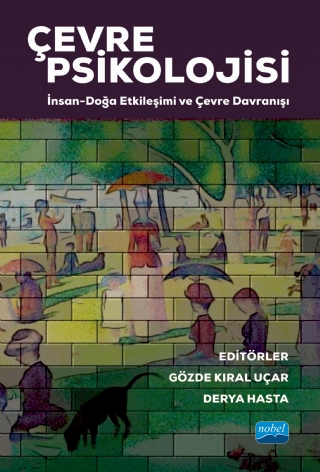Introduction to Psychology \ 1-1

Nobody thinks of reducing aviation to engineering and technique by considering it as consisting of the engine power and aerodynamic structures of aircraft. But in practice, these technical issues always come to the fore; the person running or using them stays in the background. Books dealing with aviation psychology and the human factor in accidents generally try to show where people stand in the system and how important they are in aviation. In this book, it has been tried to emphasize the "indispensable" role of man with his physiological system and psychological mechanisms.
In our age where unmanned aerial vehicles are becoming more and more widespread, it seems as if the human being is disabled, but it is necessary to see that behind all automation, computer and remote guidance systems, the human and his psychology occupy the most important position as a decision maker. One of the aims of this book, which is the first of its kind in Turkish, is to systematize scattered information about aviation psychology and make it a compact file, and another is to raise awareness of where human psychology can lead to flight, not only to flight doctors, flight psychologists and flight safety officers, but also to the aviators themselves. It also aims to provide an information infrastructure on its own subject and to shed some light on the unknowns of human beings.
In our age where unmanned aerial vehicles are becoming more and more widespread, it seems as if the human being is disabled, but it is necessary to see that behind all automation, computer and remote guidance systems, the human and his psychology occupy the most important position as a decision maker. One of the aims of this book, which is the first of its kind in Turkish, is to systematize scattered information about aviation psychology and make it a compact file, and another is to raise awareness of where human psychology can lead to flight, not only to flight doctors, flight psychologists and flight safety officers, but also to the aviators themselves. It also aims to provide an information infrastructure on its own subject and to shed some light on the unknowns of human beings.

This book provides readers with a comprehensive resource on the relationship between man and the natural environment and the psychological factors underlying environmental behavior, accompanied by scientific findings and examples from daily life. Each chapter of the book is written in a consistent, fluent and plain language by authors specialized in different disciplines of psychology.
The book not only conveys the issues focusing on human and nature interaction and environmental behavior to the reader from a psychological point of view, but also reveals striking information on environmental behavior, which is directly related to the climate crisis and other ecological problems that affect the world, and offers some solutions. In addition to all these, it also creates awareness in the reader about the effects of nature and environmental regulations on the psychological and physical health of people. In this respect, the book is a resource that can be read with pleasure not only by experts working in the field, but also by anyone interested in psychology and environmental issues.
The book not only conveys the issues focusing on human and nature interaction and environmental behavior to the reader from a psychological point of view, but also reveals striking information on environmental behavior, which is directly related to the climate crisis and other ecological problems that affect the world, and offers some solutions. In addition to all these, it also creates awareness in the reader about the effects of nature and environmental regulations on the psychological and physical health of people. In this respect, the book is a resource that can be read with pleasure not only by experts working in the field, but also by anyone interested in psychology and environmental issues.

This resource has been prepared to make it easier for experts and prospective specialists in the fields of psychotherapy and counseling to keep observation and interview notes. It also aims to assist in filing for the entire interview process in a semi-structured format.

Since you have started to read this book, we can assume that you have an interest and curiosity in psychology. Psychology attracts the attention of almost everyone at some point because it tries to explain the "me" as a human being. Some want to understand themselves, some their partner, their boss, some their children and some their parents. In other words, the effort to understand people and ourselves in the first place leads us to learn psychology. As in the verses of the famous folk poet of Anatolia, Yunus Emre, which are rosewood in our language, "Science is knowledge, knowledge is knowing yourself, if you do not know yourself, it is a lot of reading".
However, this self-knowledge, self-learning, self-discovery can often turn into a toy in the hands of those who turn science into a profit for their own interests. As a matter of fact, not understanding psychology correctly "Are you reading my mind now?" It may also cause you to become the target of the question. “I am also interested in psychology.”, “We also understand psychology, I love personal development books.” Such sentences will be some of the things that those who will specialize in this field will often hear. So, is psychology really a field that anyone who is interested in can specialize in by reading a few books? I can imagine that you answered “no” to this question. Still, it can be equally dangerous to popularize psychology too much and push it away from science, leaving it only in the hands of scientists and making it elitist. Because science will only be useful as long as it reaches people and continues to develop like a living organism in life.
The science of psychology was shaped centuries ago by the answers given by philosophers to the questions they asked to understand human, and then it was born as a science on the basis of physiological studies. Psychology continues to keep our curiosity alive today, with hundreds of theories and millions of concepts written about it.
However, this self-knowledge, self-learning, self-discovery can often turn into a toy in the hands of those who turn science into a profit for their own interests. As a matter of fact, not understanding psychology correctly "Are you reading my mind now?" It may also cause you to become the target of the question. “I am also interested in psychology.”, “We also understand psychology, I love personal development books.” Such sentences will be some of the things that those who will specialize in this field will often hear. So, is psychology really a field that anyone who is interested in can specialize in by reading a few books? I can imagine that you answered “no” to this question. Still, it can be equally dangerous to popularize psychology too much and push it away from science, leaving it only in the hands of scientists and making it elitist. Because science will only be useful as long as it reaches people and continues to develop like a living organism in life.
The science of psychology was shaped centuries ago by the answers given by philosophers to the questions they asked to understand human, and then it was born as a science on the basis of physiological studies. Psychology continues to keep our curiosity alive today, with hundreds of theories and millions of concepts written about it.